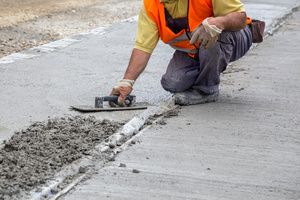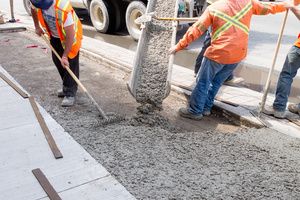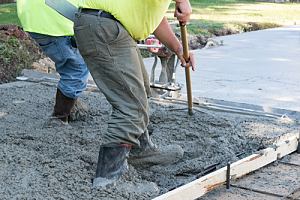5 Essential Tips for Perfecting your Concrete Work
 If you’re a construction professional or a DIY enthusiast, mastering the art of concrete work is essential. Whether you’re working on a small home improvement project or a large-scale construction job, having a solid foundation in concrete work is crucial for success. But where do you start? In this article, we’ll share five essential tips to help you perfect your concrete work and achieve outstanding results every time.
If you’re a construction professional or a DIY enthusiast, mastering the art of concrete work is essential. Whether you’re working on a small home improvement project or a large-scale construction job, having a solid foundation in concrete work is crucial for success. But where do you start? In this article, we’ll share five essential tips to help you perfect your concrete work and achieve outstanding results every time.
Firstly, proper preparation is key. From leveling the ground to ensuring the right mix ratio, taking the time to prepare your work area will lay the foundation for a successful concrete project.
Secondly, choosing the right tools and equipment is vital. From trowels to concrete mixers, having the necessary tools on hand will make your work more efficient and precise.
Thirdly, mastering the art of concrete placement is crucial. From using the right techniques to achieving the desired finish, understanding the nuances of concrete placement will help you create a flawless final product.
Next, curing the concrete correctly is essential for its long-term durability. From using curing compounds to ensuring proper moisture levels, taking the time to cure your concrete will prevent cracking and other damage.
Lastly, regular maintenance is crucial to ensure the longevity of your concrete work. From sealing the surface to fixing any cracks or damages, staying on top of maintenance will keep your concrete looking and performing its best for years to come.
With these five essential tips, you’ll have the knowledge and skills to perfect your concrete work like a pro. So grab your tools, put on your work gloves, and get ready to create stunning and durable concrete structures.
Importance of Proper Preparation
Proper preparation is key to any successful concrete project. Before you even think about pouring concrete, you need to ensure that your work area is properly prepared. This involves several steps, starting with leveling the ground. If the ground is not level, your concrete will end up uneven, which can lead to structural issues down the line. Use a level and a straightedge to check for any high or low spots and make the necessary adjustments.
In addition to leveling the ground, you also need to consider the mix ratio of your concrete. The mix ratio determines the strength and durability of the final product. Follow the instructions provided by the manufacturer or consult with a concrete expert to determine the appropriate mix ratio for your specific project. Mixing the concrete correctly is crucial, as an improper mix can result in weak or brittle concrete that is prone to cracking.
Lastly, make sure you have all the necessary tools and equipment on hand before you begin. This includes items such as a wheelbarrow, shovel, trowels, and a concrete mixer. Having the right tools will make your work more efficient and precise, saving you time and effort in the long run.
Choosing the Right Concrete Mix
 Choosing the right concrete mix is vital to achieving the desired results in your concrete work. There are various types of concrete mixes available, each with its own specific properties and uses. The type of mix you choose will depend on factors such as the application, the desired strength, and the weather conditions.
Choosing the right concrete mix is vital to achieving the desired results in your concrete work. There are various types of concrete mixes available, each with its own specific properties and uses. The type of mix you choose will depend on factors such as the application, the desired strength, and the weather conditions.
One important factor to consider when choosing a concrete mix is the aggregate size. Aggregates are the inert materials, such as sand and gravel, that are mixed with cement and water to create concrete. The size and shape of the aggregates can have a significant impact on the workability and strength of the concrete. Finer aggregates result in a smoother finish, while larger aggregates provide more strength but may require more water to achieve proper workability.
Another factor to consider is the admixtures that can be added to the concrete mix. Admixtures are substances that are added to the concrete to modify its properties. For example, plasticizers can be added to improve workability, while accelerators can speed up the curing process. Consult with a concrete expert or read the manufacturer’s instructions to determine the appropriate admixtures for your project.
Tools and Equipment Needed for Concrete Work
Having the right tools and equipment is essential for any concrete work. Without the proper tools, your work will be more challenging and less precise. Here are some of the tools and equipment you’ll need for your concrete projects:
- Shovel: A sturdy shovel is essential for mixing and moving.
- Bull Float: A bull float is used for leveling and smoothing the surface of the concrete. It is typically used before the final finishing process.
- Edger: An edger is used for creating a rounded edge along the perimeter of the concrete. This helps to prevent chipping and cracking.
- Jointer: A jointer is used for creating control joints in the concrete. Control joints help to prevent cracking by allowing the concrete to expand and contract without causing damage.
By having these tools and equipment on hand, you’ll be well-equipped to tackle any concrete project with confidence.
Step-by-Step Guide to Pouring and Finishing Concrete
 Now that you’ve prepared your work area, chosen the right concrete mix, and gathered the necessary tools and equipment, it’s time to start pouring and finishing the concrete. Follow these steps for a successful concrete placement:
Now that you’ve prepared your work area, chosen the right concrete mix, and gathered the necessary tools and equipment, it’s time to start pouring and finishing the concrete. Follow these steps for a successful concrete placement:
- Begin by pouring the concrete into the prepared forms. Start at one end and work your way towards the other, using a wheelbarrow or a concrete pump to transport the concrete if necessary.
- Use a shovel or a rake to spread the concrete evenly within the forms. Be sure to fill all the corners and edges to ensure a solid and uniform slab.
- Once the concrete is spread, use a screed board to level the surface. A screed board is a by adding the appropriate amount of water to the mixer, then gradually add the concrete mix. Use a shovel or a concrete mixer in a sawing motion to level the concrete.
- After screeding, use a bull float to further level and smooth the surface. Hold the bull float at an angle and move it in a back and forth motion across the concrete. This will help to remove any imperfections and create a smooth finish.
- Once the concrete has been bull floated, use a trowel to create the desired finish. If you’re going for a smooth finish, use a finishing trowel to create a polished surface. If you’re going for a textured finish, use a float trowel to create patterns or textures on the surface.
- Finally, use an edger to create a rounded edge along the perimeter of the concrete. This will help to prevent chipping and cracking.
By following these steps and using the right techniques, you’ll be able to achieve a professional finish in your concrete work.
Curing and Sealing Concrete for Durability
Properly treating the concrete is essential for its long-term durability. Maintaining the moisture in the concrete allows it to fully hydrate and gain strength. Proper curing helps to prevent cracking and other damage in the concrete. Here are some tips for curing your concrete:
- Use a curing compound: A curing compound is a liquid that is sprayed onto the surface of the concrete to help retain moisture. It forms a thin film that prevents the evaporation of water from the concrete.
- Cover the concrete: If you don’t have access to a curing compound, you can cover the concrete with a plastic sheet or a tarp. This will help to create a barrier that prevents moisture from escaping.
- Keep the concrete moist: It’s important to keep the concrete moist during the curing process. This can be done by lightly spraying the surface with water or by using a sprinkler the concrete moist by spraying it with water or covering it with a plastic sheet. This will help prevent moisture loss and ensure proper to direct sunlight or high winds, as these can accelerate the drying process.
In addition to curing, it’s also important to seal the surface of the concrete to protect it from stains, moisture, and other damage. There are various types of concrete sealers available, so choose the one that best suits your needs. Apply the sealer according to the manufacturer’s instructions, and be sure to reapply it regularly to maintain its effectiveness.
Common Mistakes to Avoid in Concrete Work
 While concrete work can be challenging, it’s important to avoid common mistakes that can compromise the quality and durability of your work. Here are some mistakes to watch out for:
While concrete work can be challenging, it’s important to avoid common mistakes that can compromise the quality and durability of your work. Here are some mistakes to watch out for:
- Inadequate preparation: Failing to properly prepare the ground, forms, and reinforcement can result in a weak and uneven concrete slab.
- Incorrect mix ratio: Using the wrong mix ratio can result in weak or brittle concrete. Take the time to determine the correct mix ratio for your project and measure and mix the concrete carefully.
- Improper placement techniques: Using incorrect techniques for pouring and finishing the concrete can result in a rough or uneven surface. Follow the proper steps and use the right tools to achieve a professional finish.
- Insufficient curing: Failing to properly cure the concrete can lead to cracking and other damage. Take the time to properly cure the concrete and keep it moist during the curing process.
- Neglecting maintenance: Once the concrete is in place, it’s important to regularly maintain and care for it. This includes sealing the surface, fixing any cracks or damages, and keeping the concrete clean.
By avoiding these common mistakes and following the best practices for concrete work, you’ll be well on your way to achieving professional results.
Maintenance and Care for Concrete Surfaces
Regular maintenance and care are crucial to ensure the longevity of your concrete work. Here are some tips for maintaining and caring for your concrete surfaces:
- Sealing the surface: Apply a concrete sealer to protect the surface from stains, moisture, and other damage. Follow the manufacturer’s instructions for application and reapply the sealer as needed.
- Cleaning the surface: Regularly clean the surface of the concrete to remove dirt, debris, and stains. Use a mild detergent and a soft-bristle brush or a pressure washer to clean the surface.
- Fixing cracks and damages: Inspect the concrete regularly for cracks or damages. If you notice any, repair them promptly to prevent further damage. There are various products available for repairing cracks and damages in concrete, so choose the one that best suits your needs.
- Preventing chemical damage: Avoid using harsh chemicals, such as de-icing salts or strong acids, on the concrete surface. These can cause damage and deterioration over time.
By regularly maintaining and caring for your concrete surfaces, you’ll be able to keep them looking and performing their best for years to come.
Hiring a Professional Concrete Contractor
 While DIY concrete work can be rewarding, certain projects require a professional concrete contractor’s expertise. For large-scale construction jobs or projects needing specialized knowledge and equipment, consider hiring a professional. A professional concrete contractor has the skills, experience, and resources to complete your project safely and to the highest standards.
While DIY concrete work can be rewarding, certain projects require a professional concrete contractor’s expertise. For large-scale construction jobs or projects needing specialized knowledge and equipment, consider hiring a professional. A professional concrete contractor has the skills, experience, and resources to complete your project safely and to the highest standards.
When hiring a concrete contractor, thoroughly research and ask for references. Choose a contractor with experience in your specific type of project and who holds proper licenses and insurance. Obtain multiple quotes and compare them carefully to ensure you get the best value for your money.
Achieving Professional Results in Your Concrete Work
If you’re working on a large-scale construction job or a complex concrete structure, hiring a professional concrete contractor is highly recommended. A professional contractor will have the knowledge, experience, and equipment to handle the job safely and efficiently. They will also ensure that the concrete work meets the necessary building codes and regulations.
When hiring a concrete contractor, consider the following factors:
- Experience: Look for a contractor who has extensive experience in concrete work and has completed similar projects in the past. Ask for references and photos of their previous work to assess the quality of their craftsmanship.
- Licenses and certifications: Check if the contractor holds the necessary licenses and certifications to perform concrete work in your area. This ensures that they have met the required standards and regulations.
- Insurance: Make sure the contractor has liability insurance and worker’s compensation insurance. This protects you from any liability in case of accidents or damages during the project.
- Written contract: Always sign a written contract with the contractor that outlines the scope of work, timeline, payment terms, and any other relevant details. This will protect both parties and ensure that everyone is on the same page.
The Role of Admixtures in Enhancing Concrete Durability
Incorporating the right admixtures into your concrete mix can significantly enhance its durability and performance. Admixtures, such as plasticizers and accelerators, modify the properties of concrete, improving its workability, strength, and resistance to harsh conditions. For instance, adding air-entraining agents can increase the concrete’s resistance to freeze-thaw cycles, making it ideal for cold climates. By carefully selecting and using admixtures, you can tailor your concrete to meet the specific demands of your project, ensuring long-lasting results.
Conclusion: Achieving Professional Results in Your Concrete Work
 With the five essential tips shared in this article, you now have the knowledge and skills to perfect your concrete work like a pro. From proper preparation to choosing the right tools and equipment, mastering the art of concrete placement, and ensuring proper curing and maintenance, you have all the tools necessary to achieve outstanding results in your concrete projects.
With the five essential tips shared in this article, you now have the knowledge and skills to perfect your concrete work like a pro. From proper preparation to choosing the right tools and equipment, mastering the art of concrete placement, and ensuring proper curing and maintenance, you have all the tools necessary to achieve outstanding results in your concrete projects.
Remember to take your time, follow the proper techniques, and pay attention to detail. Concrete work requires patience and precision, but the results are well worth the effort. So grab your tools, put on your work gloves, and get ready to create stunning and durable concrete structures that will stand the test of time.
Ready to perfect your concrete project? Contact us today for a personalized quote and let our experts help you achieve professional, durable results!
Summary

Dirt Connections was started with one goal in mind: providing quality residential and commercial construction services to clients on time and on budget. Reach out for more information on how we can support your next project.
For your convenience our estimates are free and by appointment. Call 703-940-9949 for a free estimate today!









































